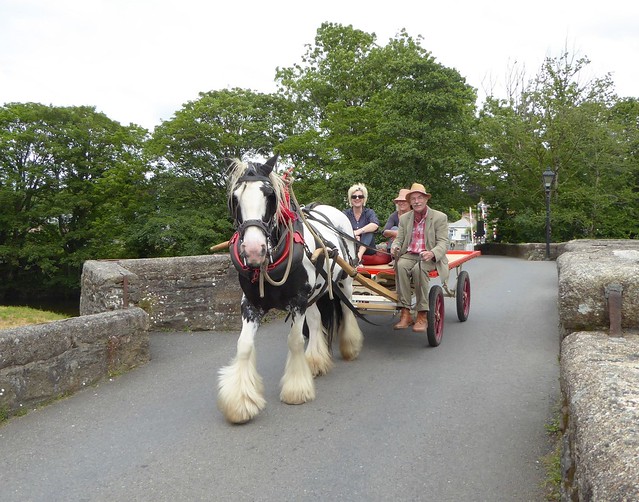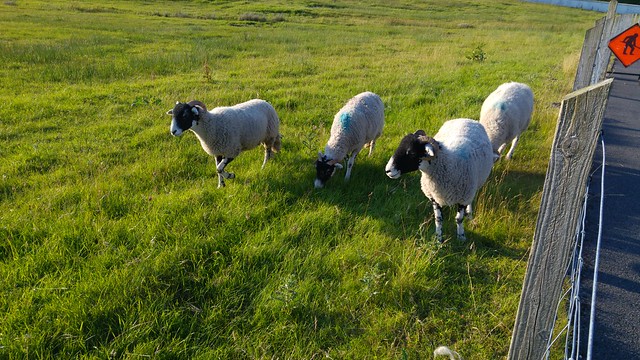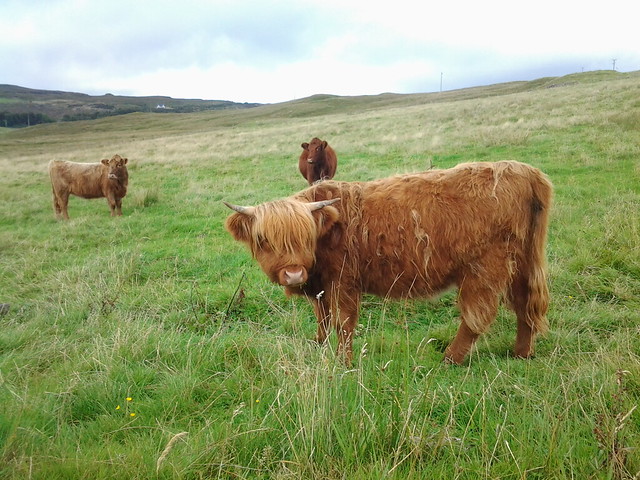Words for wagons, carts, cars and related things in Celtic languages:

| Proto-Celtic |
*karros = wagon |
| Gaulish |
*karros = wagon |
| Old Irish (Goídelc) |
carr = cart, wagon |
| Middle Irish (Gaoidhealg) |
carr = cart, waggon |
| Irish (Gaeilge) |
carr [kɑːɾˠ / kæːɾˠ] = car
carraeireacht = carting, carriage, haulage
carrán = small cart
carrbhealach = carriageway
carrchlós = car park
otharcharr = ambulance
carr sleamhnáin = sledge
carr róchain = swing |
| Scottish Gaelic (Gàidhlig) |
càr [kar] = car, cart, raft |
| Manx (Gaelg) |
carr = car, cab, van
carr laadee = lorry, wagon
carr oanluchkee = = hearse
carr surranse = ambulance |
| Proto-Brythonic |
*karr [ˈkar͈] = wagon, cart, load |
| Middle Welsh (Kymraec) |
car, kar, karr = wagon, cart |
| Welsh (Cymraeg) |
car [kar] = vehicle, car, sled, dray; rack, stand
car a cheffyl = horse-drawn carriage
car caws = cheese rack
car cerdded = go-cart, child’s cart
car trol = cart, wagon |
| Middle Cornish (Cernewec) |
carios = cart, carriage |
| Cornish (Kernewek) |
karr [karː / kær] = car
karr bonk = dodgem
karr ergh = snowmobile
karr klavji = ambulance
karr kreslu = police car
karr slynk = sleigh
karr stret = tram
karr tan = motor-car
kerrik = cart, carriage, buggy
kerrik flogh = baby carriage |
| Old Breton |
carr = cart |
| Middle Breton |
karr = cart, car, coach, carriage |
| Breton (Brezhoneg) |
karr = car, coach, carriage, trailer, vehicle
karr-ar-argad = tank
karr-a-dan = automobile, locomotive
karr-ar-marv = hearse
karr-chalbotat = lorry, truck |
Etymology: from the Proto-Indo-European *ḱr̥sós (vehicle), from *ḱers- (to run) [source].
The Gaulish word *karros was borrowed into Latin as carrus (wagon, cart, cartload), which became carro (wagon, cart, van, lorry, truck) in Italian; carro (cart, car, bus) in Spanish; car (bus, coach) in French; car, carriage and chariot in English; and similar words in other languages [source].
Words from the same PIE root include horse in English, hors (mare, female foal, frivolous woman) in Norwegian (Nynorsk), hross (horse) in Icelandic, and currus (chariot, car, wagon) in Latin [source].
| Proto-Celtic |
*karbantos = (war) chariot, wagon |
| Gaulish |
*karbanton, carbantos = chariot, wagon |
| Old Irish (Goídelc) |
carpat [ˈkarbad] = chariot
cairptech = chariot owner, chariot-fighter |
| Middle Irish (Gaoidhealg) |
carpat = war-chariot, car, waggon
carpaitniadh = chariot-fighter
carpat saer/ailtire = chariot-builder |
| Irish (Gaeilge) |
carbad [ˈkaɾˠəbˠəd̪ˠ] = chariot
carbadóir = charioteer
fo-charbad = undercarriage |
| Scottish Gaelic (Gàidhlig) |
carbad [karabad] = chariot, coach, carriage, wagon, vehicle, bier, jaw(bone)
carbadach = abounding in chariots, coaches, etc
carbadachd = (act of) driving a chariot
carbadair = charioteer, cab driver, coachman, teamster
carbad-eich = horse carriage
carbad-eiridinn = ambulance
carbad-fànais = spacecraft
carbad-mharbh = hearse
carbad-smàlaidh = fire engine
carbad-smùide = steam locomotive
carbad-suain = sleeping coach |
| Manx (Gaelg) |
carbyd = bus, coach, vehicle, bier, hearse
carbyd bee = dining car, restaurant car
carbyd clienney = pram, baby carriage
carbyd-lheeys = ambulance
carbyd-mooghee = fire engine |
| Proto-Brythonic |
*karr [ˈkar͈] = wagon, cart, load |
| Middle Welsh (Kymraec) |
kerbyt = wagon, cart |
| Welsh (Cymraeg) |
cerbyd [ˈkɛrbɨ̞d / ˈkɛrbɪd] = car, carriage, chariot, wagon, coach; clumsy fellow, bungler
cerbyd agored = open carriage, landau
cerbyd cyflog = hackney-carriage, stage-coach
cerbyd rhyfel = war chariot
cerbydan = small carriage, chaise, gig, cab
cerbydol = vehicular
cerbydwr = wagoner, coachman, charioteer |
| Old Cornish (Cernewec) |
cerpit = chariot, wagon |
| Old Breton |
cerpit = chariot, wagon |
| Breton (Brezhoneg) |
karbed = vehicle
karbed-tan = motor vehicle
karr tredan = electric vehicle |
Etymology: possibly related to the Proto-Celtic word *korbos (wagon, basket) [source]. The Brytonic words were borrowed from Old Irish [source].
The Gaulish word carbantos was borrowed into Latin as carpentum (carriage, chariot, wagon, cart), which became charpente (framework, structure) in French [source].
| Proto-Celtic |
*wegnos = wagon, cart
*wegnyā = wagon |
| Old Irish (Goídelc) |
fén [fʲeːn] = wagon, cart |
| Middle Irish (Gaoidhealg) |
fén = waggon, cart, conveyance of some kind |
| Irish (Gaeilge) |
féan [fʲeːnˠ] = wagon, wain, cart |
| Scottish Gaelic (Gàidhlig) |
feun [fian] = cart, wain, chariot
feunair = waggoner
feun-cogaidh = war chariot
feun-mòine = peat cart |
| Manx (Gaelg) |
fainagh = carriage, chariot, coach
fainagh cabbil = horsedrawn coach
fainagh-bee = restaurant car |
| Proto-Brythonic |
*gweɨn = wagon, cart |
Etymology: from the Proto-Indo-European *weǵʰ- (to go, transport) [source]. English words from same PIE root include wagon, weigh, way wain (a four-wheeled cart for hauling loads, usually pulled by horses or oxen), vehicle and vector [source].
There appear to be no descendents of the Proto-Brytonic word *gweɨn in the Brythonic languages, but the Welsh word certwain (cart, wagon, wain) is indirectly related. It comes from the Old English crætwǽn (chariot, wain – lit.”cart-wain”) [source], from cræt / ceart (cart, wagon, chariot), from the PIE *krattijô (basket) [source], and wæġn (wagon, carriage) [source].
| Proto-Celtic |
*bennā, *bondyo = bracelet |
| Gaulish |
*benna = carriage |
| Old Irish (Goídelc) |
buinne [ˈbun͈ʲe] = circlet, (arm-)ring, bracelet, wattle, wickerwork |
| Middle Irish (Gaoidhealg) |
buinne = circlet, (arm-)ring, bracelet, wattle, wickerwork |
| Irish (Gaeilge) |
buinne [ˈbˠɪn̠ʲə] = course of interwoven rods, wale; hoop; ridge; welt (of shoe); flange (of vessel); band, bracelet; shroud |
| Middle Welsh (Kymraec) |
benn, ben = cart, wagon, carriage, wain
benneit = cart-load, wain-load |
| Welsh (Cymraeg) |
ben = cart, wagon
bennaid = cart-load, wain-load |
Etymology: from the Proto-Indo-European *bʰendʰ- (to bind, bond). Words from the same Proto-Celtic root, via the Latin benna (a kind of carriage), include benne (bin, skip, dump truck, barrow, cable car) in French, bin in English, and benna (bucket, grab) in Italian [source].
English words from the same PIE root include band, bandage, bandana, bend, bind, bond, bonnet, bundle, funicular, tulip and turban [source].
Words marked with a * are reconstructions.
Sources: Wiktionary, Am Faclair Beag, Online Manx Dictionary, Teanglann.ie, eDIL – Electronic Dictionary of the Irish Language, In Dúil Bélrai English – Old Irish glossary, Geiriadur Prifysgol Cymru, Gerlyver Kernewek, Gerlyvyr Cernewec, Dictionaire Favereau, TermOfis, Le dictionnaire diachronique du breton, Geriafurch, English – ProtoCeltic WordList (PDF), Etymological Dictionary Of Proto Celtic












